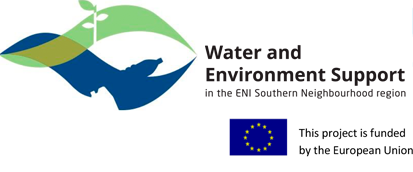The overall aim of this ‘repository’ of selected practices is to promote circular economy and waste reduction across the municipal waste management chain in the Mediterranean. Its creation was part of the work programme of the EU-funded Water and Environment Support (WES) in the ENI Neighbourhood South Region (2019-2023): identify, document, and disseminate key best practices to improve the implementation of the 3Rs for municipal waste in eight countries of the southern Mediterranean: Algeria, Egypt, Israel, Jordan, Lebanon, Morocco, Palestine, and Tunisia. WES consortium members MIO-ECSDE, ACR+ and LDK Consultants were in charge of the activity.
This website contributes to the UfM’s 2030GreenerMed Agenda and very specifically to the launching of a Flagship Initiative of UNEP/MAP’s Mediterranean Strategy for Sustainable Development (MSSD 2016-2025) under Strategic Direction 3.4 “Promote sustainable waste management within the context of a more circular economy”: Undertake regional assessments, as well as knowledge exchanges, of high- and low-tech solutions, that have been successfully implemented to achieve (solid) waste reduction. The Mediterranean Commission on Sustainable Development of UNEP/MAP supports and monitors the implementation of the MSSD 2016-2025. In early 2021, WES (through MIO-ECSDE), UNEP/MAP, UfM and the Circle of Mediterranean Parliamentarians for Sustainable Development (COMPSUD) launched this collective effort to set the MSSD 2016-2025 Flagship Initiative 3.4.5 into motion.
“Towards 2030: Agenda for a Greener Med – Contributing to Achieving the Environmental SDGs in the Mediterranean” or “2030GreenerMed” defines the post-2020 UfM Environment Agenda. The Agenda addresses key environmental issues in the Mediterranean that require cooperation across borders and sectors, and was developed collaboratively with countries and stakeholders, linking local experience with decision-making processes at national, regional and international levels. It is a living document and was built on the conclusions and results of the H2020 Initiative for a Cleaner Mediterranean, the SCP programmes and other relevant programmes; it is also linked to the Agenda 2030 and the Sustainable Development Goals. In this Agenda, a green, fair and circular economy, Sustainable Consumption and Production and minimization of plastics, solid waste management and abatement of marine litter, are all integral components. WES is one of the EU regional projects that is supporting the implementation of the 2030GreenerMed Agenda as adopted by the 2nd Ministerial Meeting on the 4th of October 2021.
The Mediterranean Strategy for Sustainable Development (MSSD) 2016-2025 provides an integrative policy framework for all stakeholders to translate the 2030 Agenda for Sustainable Development and the Sustainable Development Goals (SDGs) at the regional, sub-regional, national and local levels in the Mediterranean region. The MSSD was adopted by all Mediterranean countries at the 19th Meeting of the Contracting Parties to the Barcelona Convention (COP 19) (Athens, Greece, 9-12 February 2016) (Decision IG.22/2), with the following vision: “A prosperous and peaceful Mediterranean region in which people enjoy a high quality of life and where sustainable development takes place within the carrying capacity of healthy ecosystems. This is achieved through common objectives, strong involvement of all stakeholders, cooperation, solidarity, equity and participatory governance”. It is complemented by the Regional Action Plan on Sustainable Consumption and Production (SCP) in the Mediterranean.
Under the MSSD 2016-2025 Objective 3 (Planning and managing sustainable Mediterranean cities), the Strategic Direction 3.4 “Promote sustainable waste management within the context of a more circular economy” addresses solid and liquid waste production and management, which remain a major concern in many urban regions in the Mediterranean. It aims at the promotion of national measures for implementing innovative waste management solutions, in line with the waste hierarchy: prevention, reduction, reuse, sorting, recycling, recovery, and, as the least preferred option, disposal. Priorities are also to develop behavioral change schemes that will lead to reduction in waste volumes and to develop legal and financial frameworks to support sustainable waste management.
The MSSD 2016-2025 flagship Initiative 3.4.5 aims at the elaboration of a regional assessment of high-tech and low-tech solutions, including but not limited to awareness-raising and economic measures that have been implemented, with a view to their more widespread utilization in waste reduction efforts. A target associated with this strategic direction is to substantially reduce waste generation through prevention, reduction, recycling and reuse by 2030.
The activity aimed at identifying best practices focusing on municipal waste, on various aspects of circular economy, including prevention, re-use, and recycling, and addressing different aspects (the involvement of citizens for waste reduction and source separation, collection systems, the relation with human health, etc.) and instruments (awareness raising, economic instruments, new legal requirements, incentives, etc.) with a key criterion being their transferability to the WES partner countries.
To ensure that the activity was relevant and useful to the different target audiences (national authorities, local authorities, waste utility companies, etc.), a stakeholder consultation was conducted (on-line survey and interviews). The main objectives were:
- To get a good overview on the key priorities, challenges, and needs of the different stakeholders in the eight countries;
- To collect information on existing good practices and frontrunners.
The following criteria guided the final selection (out of 59 identified case studies):
- Quality of information available
- Effectiveness of the practice (in terms of actual results)
- Innovative character
- Potential for replication and upscaling
Although some practices proved to face quite significant challenges, and in many cases the achieved results were limited, when considering the context in which they were developed (lack of proper regulation, unfavourable economic settings, etc.) they have all improved the waste management situation and offer valuable lessons learned.
The UfM and the WES project have co-funded the development of this website.
UNEP/MAP supports the implementation of the Mediterranean Strategy for Sustainable Development (MSSD) 2016-2025.
The ‘Water and Environment Support (WES) in the ENI Neighborhood South Region’ project is led by LDK Consultants Global EEIG.
Consortium partners ACR+, MIO-ECSDE and LDK Consultants developed the presented case studies.
This website was developed in collaboration with ENT Environment & Management | Fundació ENT


